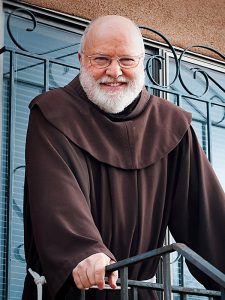
It’s Fr. Richard Rohr, OFM’s, opinion that in life’s beginning, people need structure — they need continuity, predictability and impulse control before they can develop their own internal values.
“We are a ‘first-half-of-life culture,’ largely concerned about surviving successfully,” wrote Rohr, an author and Franciscan friar, in his 2011 book Falling Upward: A Spirituality for the Two Halves of Life.
It’s the first half of life that Rohr’s interfaith lecture will provide guidance for.
At 2 p.m. today in the Hall of Philosophy, Rohr will speak on “The First Half of Life,” part of his Week Four interfaith journey “Falling Upward: A Week with Richard Rohr, OFM.”
All week, Rohr will be lecturing and preaching on how best to navigate life’s obstacles, with the interfaith lectures “The Transition” on Tuesday, “The Resistance” on Wednesday and “The Second Half of Life” on Thursday.
“When I entitled the book, ‘Falling Upward,’ I actually thought it would not be accepted by the publisher, because I presumed there had been many other books already that would have thought of that title,” Rohr said in a speech at Texas Lutheran University in 2011.
Rohr said the “mystery and the paradox of the wording “falling upward” isn’t an easy thing for people to discuss.
“But as a Christian, I’m convinced it’s at the very heart of what we call the ‘death and resurrection mystery of Christ,’ ” he said in 2011.
Still, Rohr was quick to admit he didn’t have all the answers to life’s questions.
“I quote Carl Jung, the Swiss psychologist, in the front of the book: ‘The greatest and most important problems in life are fundamentally unsolvable. They can never be solved, but only outgrown,’ ” he said. “I had to live to 68 to absolutely believe that’s true.”
Life’s enigmas exist to teach lessons, according to Rohr, and the same goes for life’s failures.
“Life, if we are honest about it, is made up of many failings and fallings, amidst all of our hopeful growing and achieving,” Rohr wrote. “Those failings and fallings must be there for a purpose, a purpose that neither culture nor church has fully understood. Most of us find all failure bewildering, but it does not have to be.”
In fact, according to Rohr, simply identifying the curve of life’s arc can resolve a whole host of potential problems.
“Most people are trying to build the platform of their lives all by themselves, while working all the new levers at the same time,” Rohr wrote. “I think of CEOs, business leaders, soldiers or parents who have no principled or ethical sense of themselves and end up with some kind of ‘pick and choose’ morality in the pressured moment.”
And that’s what Rohr’s book markets itself as — a defense against the danger of the “pressured moment.”
“Perhaps (this book) is like a medical brochure that describes the possible symptoms of a future heart attack,” he wrote. “Reading it when you’re well might feel like a waste of time, but it could make the difference between life and death if a heart attack actually happens.”
A central component to Rohr’s philosophy is that human beings need “containers,” or a clear sense of self-identity, in the first half of life.
Rohr wrote that “without law in some form, and also without butting up against that law, we cannot move forward easily and naturally.”
“We are not always helping our children by preventing them from what might be necessary falling, because you learn how to recover from falling by falling,” he wrote. “Law and tradition seem to be necessary in any spiritual system both to reveal and to limit our basic egocentricity, and to make some community, family, and marriage possible.”
According to Rohr, the students and workforce of America have been largely deprived of “necessary falling.”
“If you want the opposite (of a job done well), hire someone who has been coddled, been given ‘I Am Special’ buttons for doing nothing special, and had all his or her bills paid by others, and whose basic egocentricity has never been challenged or undercut,” Rohr wrote. “To be honest, this seems to describe much of the workforce and the student body of America.”




